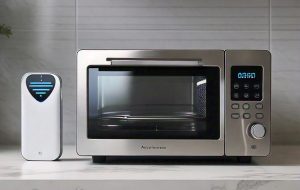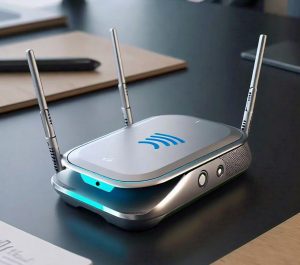Wifi interference pertains to disruptions in a wifi network caused by various factors such as overlapping signals, physical obstructions, or electronic devices.
The question here is whether a microwave can cause interference with your wifi signal.
This article will provide an in-depth analysis of the topic of microwaves potentially interfering with wifi signals. We’ll investigate if and how this technology appliance could disrupt wireless internet connections based on scientific studies and expert insights. Should it be confirmed that microwaves do interfere, we’ll discuss the extent of this disruption: does it completely disconnect you or merely slow down your connection? Conversely, if they don’t interfere directly, we will explore what other appliances or situations might affect your wifi signal. Furthermore, tips on how to prevent or minimize possible interference will be shared along with relevant FAQs for additional guidance and our final word on the matter.

Jump To:
Does a Microwave Interfere With Wifi?
Indeed, microwaves can interfere with wifi. Microwaves and wifi routers both operate on the same 2.4GHz frequency range. When the microwave is in use, it can cause a disruption of this frequency leading to issues with your wifi connection. However, not every microwave will cause this interference; it mainly depends on the quality and shielding of your specific appliance and router. In contrast, other household devices and appliances do not typically interfere with wifi signals as they utilize different frequencies.
Check out if a microwave can leak radiation.
Facts About Microwave Interference with Wifi
Here, we will discuss the important things to note about how microwaves can interfere with Wi-Fi.
- Type of Interference: Microwaves operate on a frequency of 2.4GHz which is similar to the frequency used by many Wi-Fi routers, causing potential interference.
- Distance and Obstruction: The closer your router is to the microwave, the greater the chance for possible interference. Also, any obstructions between them could amplify this effect.
- Microwave Shielding: If a microwave oven’s shielding is compromised or damaged, it may leak higher than normal amounts of radio waves leading to increased interference.
- Dual-Band Routers: Modern dual-band routers that support both 2.4GHz and 5GHz bands can switch frequencies when necessary thus reducing potential conflict.
We have now understood some crucial points about how microwaving may interfere with wi-fi signals.
Next, we will delve into other aspects related to microwaving technology and its implications for our daily lives.
What are the Alternatives to Microwaving Wifi?
The question about alternatives to microwaving wifi can be a bit tricky because it’s not usual or recommended to microwave this type of technology. However, if your concern revolves around interference between your microwave and wifi, there are several ways you can prevent this from happening without resorting to microwaving. The most effective alternative is placing your router far away from your kitchen where you usually use the microwave. You could also switch your wifi network’s channel for less interference or consider using a dual-band router that operates on both 2.4 GHz and 5 GHz frequencies.
Check out if a microwave radiation can hurt you.
Tips to Ensure Your Microwave Doesn’t Interfere with Your Wifi
Microwaving a wifi device is not advisable as it may damage its components and interfere with its operation. But here are some general tips when dealing with potential interferences between microwaves and Wi-Fi devices:
- Position your router away from the kitchen or wherever the microwave oven is placed.
- Use Ethernet cables for important connections which require stable internet.
- Avoid using the microwave oven while requiring a high-speed internet connection in demanding tasks such as video conferencing, online gaming etc.
- Switching the Wi-Fi channel – This might help reduce interference by changing frequency bands.
In conclusion, while it’s possible that a running microwave could cause minor disruptions in wifi connectivity due to emitted electromagnetic waves, putting any sort of non-food item such as wifi routers into an operating microwave is highly discouraged for safety reasons and may result in irreversible damage.
Check out how hot a microwave can get.
Up next, we will address commonly asked questions related directly or indirectly to this topic.

Frequently Asked Questions (FAQs)
In this section, we will now look at the most commonly asked questions related to microwaving and its potential interference with other electronic devices such as wifi.
Can microwave interfere with wifi?
Yes, a microwave can interfere with wifi signals. When the microwave is in use, it generates electromagnetic radiation in the same 2.4 GHz frequency range used by wi-fi routers. This can cause temporary disruptions or weakening of your wifi signal strength while heating food items.
Does using a Microwave affect Bluetooth connections?
Absolutely, similar to wifi interference, microwaves can also affect Bluetooth connections. Bluetooth operates on the same 2.4GHz frequency spectrum as a microwave oven which may lead to connection instability during simultaneous operation due to noise interference.
Can microwaves interfere with mobile networks?
No, typically microwaves should not interfere with mobile networks because they operate on different frequencies. However extreme cases of malfunctioning or leakage from an old or damaged microwave could potentially cause some disruption but it’s extremely rare.
How far should my router be from my microwave?
To minimize any possible interference between your router and the microwave oven keep these devices separate by at least several feet distance if possible – ideally around 15-20 feet apart would be best for signal integrity.
We hope you found this FAQs section enlightening in terms of understanding how household appliances like microwaves can interact with our day-to-day technology usage.
Final Word
In conclusion, while everyday household appliances like microwaves are essential for our convenience they may occasionally disrupt other technologies due to overlapping operating frequencies. By being aware and strategically placing these items within our homes we can minimize any potential interference and continue to enjoy the benefits of both. Remember, it’s always a good practice to place your wifi routers or Bluetooth devices away from microwaves for optimal performance.



